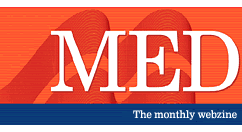 |
 |
 |
 |
 |
 |
|
|
||||
|
Contributors |
|||
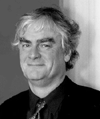 |
Michael Hoey is Baines Professor of English Language and Director of the Applied English Language Studies Unit at the University of Liverpool. His major publications include Signalling in Discourse (1979), On the Surface of Discourse (1983/91), Patterns of Lexis in Text (1991), which was awarded the Duke of Edinburgh English-Speaking Union Prize for the best book on Applied Linguistics in 1991, and the edited collection, Data Description Discourse (1993). His most recent book is Textual Interaction (2001). He is co-editor with Tony McEnery of a series of books on Corpus Linguistics, published by Routledge, and is Chief Adviser on the Macmillan English Dictionary and Macmillan Essential Dictionary, and the author of the foreword of the Macmillan English Dictionary. His administrative roles include that of Chair of the Assessment and Qualifications Alliance’s English Committee. He is also a keen supporter of CAMRA and is currently editing a Real Ale Guide for Southport & District. So if you see him at any of the Macmillan sponsored lectures he is giving, do be sure to tell him where the nearest microbrewery is to be found (and, even better, take him there).
|
|||
 |
Mairi
MacDonald
Mairi taught English in Lithuania and Poland before returning to the UK to work in publishing. She has worked on several multimedia dictionary projects including the Macmillan English Dictionary on CD-ROM. Mairi works part-time as editor of History Online, a website aimed at secondary school teachers. The rest of her time is devoted to various ELT projects and developing learning materials for the web.
|
|||
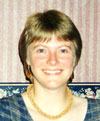 |
Kerry
Maxwell
Kerry has a first degree in computational linguistics and an MA in theoretical linguistics from the University of Manchester, specialising in syntactic theory. For several years she worked as a researcher at Manchester and Essex universities, where in connection with European projects on machine translation, she was involved in computational lexicography, co-ordinating research in computational descriptions of compounds and collocations, and presenting her work in various international academic contexts. In 1993 she joined Cambridge University Press as a lexicographer/editor and grammar consultant, and worked on a large number of Cambridge learners’ dictionaries, including the English Pronouncing Dictionary, the Cambridge International Dictionary of Phrasal Verbs and the Cambridge Learner’s Dictionary in print and CD-ROM versions. In June 2001 Kerry moved to York where she now works as a freelance editor/lexicographer and is involved in a range of dictionary and grammar projects.
|
|||
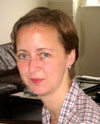 |
Diane
Nicholls
I don’t know how or when I became a lexicographer, though I think I have always been a linguist. My first degree, in Russian and French at the University of Reading led on to a postgraduate diploma in technical and specialized translation from the Polytechnic of Central London. A long spell of working as a translator, freelance and in-house, brought me to the realization that my passion for languages lay in the individual words themselves rather than in any finished documents I might produce and that translating, while a great discipline, would never allow me the time to ‘enjoy’ the words. I returned to academic study and an Mlitt in Slavonic Studies at Cambridge University. There I spent my time analysing and enjoying the language and style of the short stories of Anton Chekhov and wondering how I would ever manage to make a living using my language skills. Freelance work at Cambridge University Press provided the answer and my first non-user experience of dictionaries. It was through my work on False Friends for the Cambridge International Dictionary of English that I came into contact with the Acquilex project – an international computational lexicography project on multilingual lexical databases. Two years of working as a research assistant on Acquilex provided me with an excellent apprenticeship and finally sealed my fate (in career terms). Since the end of the Acquilex project in 1995 I have worked as a freelance linguist/lexicographer and revelled in the variety and flexibility this role offers. I have worked on highly commercial software development projects as far away as Silicon Valley in California, on academic research projects closer to home and in Hong Kong and the US and on a variety of dictionary publishing projects, including learner corpora, learners’ and native-speaker dictionaries and thesauruses (CUP, Bloomsbury, OUP, Macmillan). Among other things, I seem to have found a niche in developing and executing categorization and coding systems and can usually be found wading up to my neck in words, trying to marshal them into some sort of order while secretly admiring their slipperiness. Writing articles for the MED resource site provides me with an opportunity to get a few things off my linguistic chest and express some of my admiration for the things that words can do and the problems they can cause their users. I live in Hackney, London with my husband, Rory. |
|||
| Meet the Editor | ||||
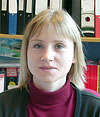 |
Kati
Sule
Kati was born in Hungary. She studied English Language and Literature at the University of Szeged in south-east Hungary and also completed an ELT degree, writing her dissertation on the role of monolingual dictionaries in ELT. She taught English as a foreign language in Hungary and briefly in the Netherlands. Kati moved to the UK in 1998 and has worked as an ELT
editor since 1999. She has been involved in the Macmillan English Dictionary
project, focusing on the illustrations in the dictionary, and was editor
of the Macmillan English Dictionary
Workbook. She has also worked on the
CD-ROM edition of MED and is one of the editors of the Macmillan
English Dictionary resource site. |
|||
|
Cover illustration by Andrew Peters. Dictionary extracts
taken from the Macmillan English Dictionary for Advanced Learners,
published by Macmillan Education 2002, text © Bloomsbury Publishing
Plc 2002 |
||||
|
|
||||